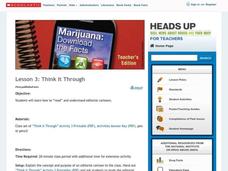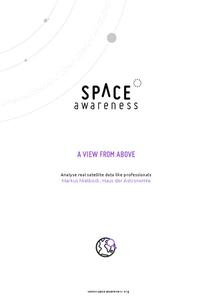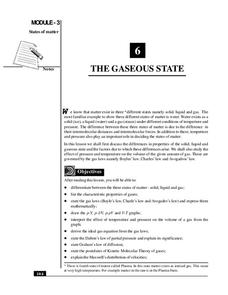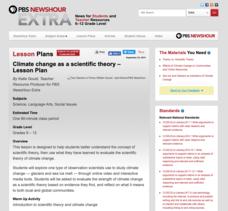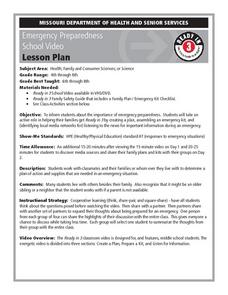NOAA
Are You Climate Literate?: Play the Essential Principles Challenge
Installment eight of the 10-part Discover Your Changing World series tests the class's understanding of climate. Scholars play alone or in small groups to assess their understanding of climate systems, causes of climate...
Channel Islands Film
Once Upon a Time (Saxipak’a): Lesson Plan 4
How did the environment and natural resources found on the Channel islands influence the culture of the Chumash? Archaeology meets technology in an activity designed for middle schoolers. After viewing West of The West's documentary Once...
Scholastic
Think it Through
What does the media tell the teenagers about using marijuana? Help class members decipher what they are being told about drug use with a lesson on editorial cartoons, subliminal messages, and critical thinking skills.
Curated OER
Tell Us All: Tools for Integrating Math and Engineering
What a scam! Middle and high schoolers pose as journalists exposing consumer fraud. In this lesson, they write an article for a magazine using data collected during previous investigations (prior lessons) to defend their findings that a...
Space Awareness
A View From Above
Analyzing and interpreting satellite data takes knowledge and patience. Through a detailed lab investigation, young scholars learn the process of analyzing this data. They use technology to create color images and maps from real...
Space Awareness
The Climate in Numbers and Graphs
Weather versus climate: weather relates to short time periods while climate averages the weather of a period of many years. Scholars learn about average temperature and precipitation in various climate zones and then apply statistics...
National Wildlife Federation
An Energy Mix: Renewable and Nonrenewable Resources
What did the windmill say about renewable energy? I'm a BIG fan! Lesson three in the series of 12 has classes discuss potential and kinetic energy and then, in pairs, they complete a web quest over the different types of energy...
WindWise Education
How Does Energy Affect Wildlife?
Is wildlife affected the same way by different electricity generation methods? Teams work together to research four electricity generation sources and their impacts on wildlife. The teams create a summary report and share their...
NOAA
Deep-Sea Ecosystems – Life is Weird!
A pool of brine in the deep sea can be up to four times as salty as the surrounding sea water. The deep sea ecosystem relies on chemosynthesis and the organisms that live there are often strange to us. The instructional activity focuses...
Curated OER
Showdown in the New Wild West
What is the root of the conflict between ranchers and environmentalists? Middle schoolers write their impressions of what an environmentalist is and does. They read the New York Times article "In New Wild West, It's Cowboys vs....
National Institute of Open Schooling
The Gaseous State
Sixth in a series of 36, this lesson focuses on gases and their behavior in given situations. Learners review the states of matter and then focus on gases, specifically learning Boyle's, Charles's, Avogadro's Laws, Dalton's, and Graham's...
Curated OER
A Lesson in Biodiversity: Making Comparisons Between Defensive Mechanisms Utilized by Marine Organisms
If your upper elementary or middle school marine biology learners are going to visit an aquarium, then here is a field trip activity guide for you. It is written specifically for The Maritime Aquarium, but the idea can be adapted to...
Curated OER
Meiosis
Students study meiosis and how it leads to variation. In this genetic reproduction lesson students complete a lab activity that calculates different genetic possibilities.
PBS
Climate Change as a Scientific Theory
Get your class thinking about climate change as a scientific theory. Guided by a handout, emerging earth scientists read articles and take notes about glaciers and sea ice. To conclude, they write an evaluation of the evidence for...
PBS
Stories of Painkiller Addiction: Learning About Opioids
Feeling high is not the only side effect of abusing prescription opioids. Middle and high schoolers learn more about specific painkillers, including Fentanyl, Oxycodone, and Clonazepam, as well as their common brand names and extensive...
Curated OER
The Seasons of the Year
Students learn about the four seasons. They collaborate in pairs, publish a book, and share with the class. They also brainstorm and collaborate with each other providing literacy skills through listening, speaking and writing activities.
Curated OER
Lord of the Rings - A Study of Tree Rings
Students examine trees and discuss how the environment effected the tree. They also predict what the area look like in fifty years.
Curated OER
Into the Bat Cave
Students explore the lives of bats. In this bat lesson plan, students participate in up 6 activities that focus on bats and build their background knowledge about the nocturnal mammals.
Blake Education
Harry Potter and the Philosopher’s Stone
The motto for Hogwarts School of Witchcraft and Wizardry warns that one should never tickle a sleeping dragon, but learners will definitely be tickled by the activities in a packet of materials designed to accompany a reading of the...
Southwestern Medical Center
Field Epidemiology: Investigation of an Unknown Disease
More than 90 percent of the people in a building have come down with an illness, and it is your job to investigate. Teachers give scientists the data needed to decide what is important and how they can solve the mystery....
NOAA
Communicate!: Create a Unique Message About Climate Change
Scholars use their communication skills to express their take on climate change in the ninth installment of the 10-part Discover Your Changing World series. They create ways to deliver their messages on a specific aspect of climate by...
Howard Hughes Medical Institute
Weighing the Evidence for a Mass Extinction Part 2: On Land
What can fossils tell us about periods of extinction? Young scholars interpret fossil layers to make conclusions about changes in life during different geological time periods. They analyze the fossils for abundance and diversity as well...
Howard Hughes Medical Institute
Finding the Crater
A mass extinction event caused by an impact usually leaves a crater. Scholars use data from 10 different sites around the world trying to determine where to look for the crater. They use data, listing the amount of various minerals to...
Curated OER
Family Emergency Preparedness
Middle schoolers watch a video prior to developing a family emergency preparedness plan and kit. They decide with their families what local media sources they would use to get information during an emergency situation.




